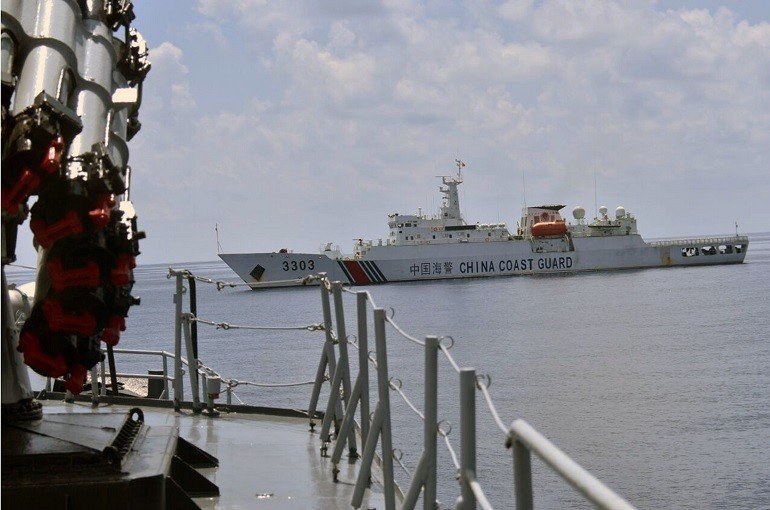Popular Reads
Top Results
Can't find what you're looking for?
View all search resultsPopular Reads
Top Results
Can't find what you're looking for?
View all search resultsPainful first years of maritime axis ambition
Change text size
Gift Premium Articles
to Anyone
 Chinese coast guard ship 3303 passes near Imam Bonjol warship 383 as the Indonesian Navy pursues the Han Tan Cou fishing vessel entering Indonesia's Natuna waters on June 17. The Navy caught the China-flagged boat suspected of illegal fishing in Indonesian waters. (Antara/Photo Courtesy of The Navy's Western Region Fleet Command (Koarmabar))
Chinese coast guard ship 3303 passes near Imam Bonjol warship 383 as the Indonesian Navy pursues the Han Tan Cou fishing vessel entering Indonesia's Natuna waters on June 17. The Navy caught the China-flagged boat suspected of illegal fishing in Indonesian waters. (Antara/Photo Courtesy of The Navy's Western Region Fleet Command (Koarmabar))
W
hen addressing the Ninth East Asia Summit in Nay Pyi Taw, Myanmar, on Nov. 13, 2014, newly sworn-in President Joko “Jokowi” Widodo sought to impress his audience with his “Indonesia as the world’s maritime axis” initiative.
In fact, Jokowi had eagerly waged a “turn to the sea” campaign on his journey to the presidency. It was a promise he made out of concern that the nation’s maritime development had been largely neglected despite its gargantuan potential.
Of Indonesia’s 2 million square kilometers of territory, 96,000 square kilometers are comprised of sea. In ancient times, our ancestors were renowned seafarers and our glorious kingdoms were connected with the rest of the world by the sea.
The nostalgic Jokowi means to focus his maritime development agenda on five aspects: rebuilding maritime culture, promoting maritime resources as part of Indonesia’s food security, prioritizing marine infrastructure development, bolstering maritime diplomacy and strengthening maritime forces for the safety and security of shipping.
To laypeople and foreign countries alike, the literally explosive tactics against foreign poaching boats have been the most noticeable aspect of his rigorous campaign to fight illegal, unreported and unregulated fishing. Transnational crimes such as piracy, illegal fishing and human trafficking remain a challenge.
Two years into his five-year term, Jokowi is yet to build substantial infrastructure in the form of world-class seaports on major islands, provide more fishing vessels, reform the fish-trading system or systematically develop human resources to make his dream come true.
What he has done has largely been a bureaucratic reshuffle. For instance, Jokowi established the Maritime Security Board (Bakamla) on Dec. 15, 2014. The move was intended to improve coordination among the 14 institutions in charge of maritime affairs. Their coordination has so far proved ineffective because each has its own standard procedures with overlapping responsibilities.
Obviously, poor coordination is not the only problem. Now, Bakamla officials are complaining about the lack of legislation on technicalities and job descriptions. Furthermore, the task force has yet to do its job properly because of inadequate human resources and equipment.









